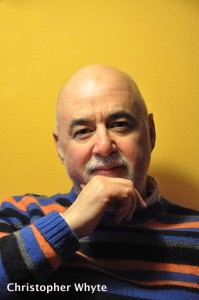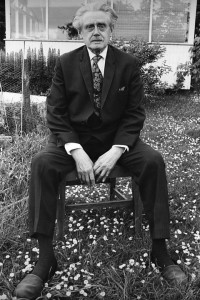
Whyte will start out by explaining the huge impact made on him by discovering the poetry and prose of MacDiarmid in the early 1970s. Independence was then a distant mirage, a Scottish parliament seemingly impossible, and MacDiarmid’s work known only to a happy few, not all of whom were doctrinaire nationalists. Looking at a couple of early lyrics, he will attempt to account for their astounding quality and then, moving on to MacDiarmid’s ‘First Hymn to Lenin’ from 1931, confront one major stumbling block, the poet’s repeated and vocal support for criminal totalitarian regimes, as one manifestation of a more generalised phenomenon of “leftism” (public support for such regimes on the part of intellectuals who themselves chose to reside in democratically organised societies). A letter and an article from 1951 contain glowing accounts of a visit MacDiarmid made to the Soviet Union. He quotes approvingly from a speech by Zhdanov, and made a point of rejoining the Communist party in the wake of the 1956 Hungarian Uprising.
 A further problematic issue has been the realisation that much, if not all of his masterpiece In Memoriam James Joyce (published in 1955) is in fact a compilation, with subtle adjustments, of multiple texts by other hands, mostly unacknowledged. While raising fascinating questions about authorship, originality and intertextuality, the phenomenon has preoccupied and intimidated potential critics of his art. If MacDiarmid’s abuse of alcohol, and the circumstances under which he separated from his first wife, are further possible sources of shame, rendering him a difficult predecessor to relate to, Whyte will argue that the ultimate shame lies in his country’s neglect both of the poet during his lifetime, and of a body of work which, however controversial, can stand comparison with that of many other, justly celebrated intellectual and creative figures from the same historical period. He will argue that the growing phases in Scottish culture and criticism are marked by renewed engagement with this contradictory, infuriating and inspiring body of work, and will review the predicament faced by major figures operating within a culture which is limited either numerically, or in its material resources, or in terms of outlook.
A further problematic issue has been the realisation that much, if not all of his masterpiece In Memoriam James Joyce (published in 1955) is in fact a compilation, with subtle adjustments, of multiple texts by other hands, mostly unacknowledged. While raising fascinating questions about authorship, originality and intertextuality, the phenomenon has preoccupied and intimidated potential critics of his art. If MacDiarmid’s abuse of alcohol, and the circumstances under which he separated from his first wife, are further possible sources of shame, rendering him a difficult predecessor to relate to, Whyte will argue that the ultimate shame lies in his country’s neglect both of the poet during his lifetime, and of a body of work which, however controversial, can stand comparison with that of many other, justly celebrated intellectual and creative figures from the same historical period. He will argue that the growing phases in Scottish culture and criticism are marked by renewed engagement with this contradictory, infuriating and inspiring body of work, and will review the predicament faced by major figures operating within a culture which is limited either numerically, or in its material resources, or in terms of outlook.
Event detail
- Event start
- 21. 10. 2015 14:00
- Venue
- Faculty of Arts, Jan Palach Square 2, 116 38 Prague 1, room 111
- Organizing Institution
- Department of Anglophone Literatures and Cultures
- Event type
- Lecture
- Přílohy
- p0279171
MacDiarmid,-Hugh-by-Gordon-Wright




